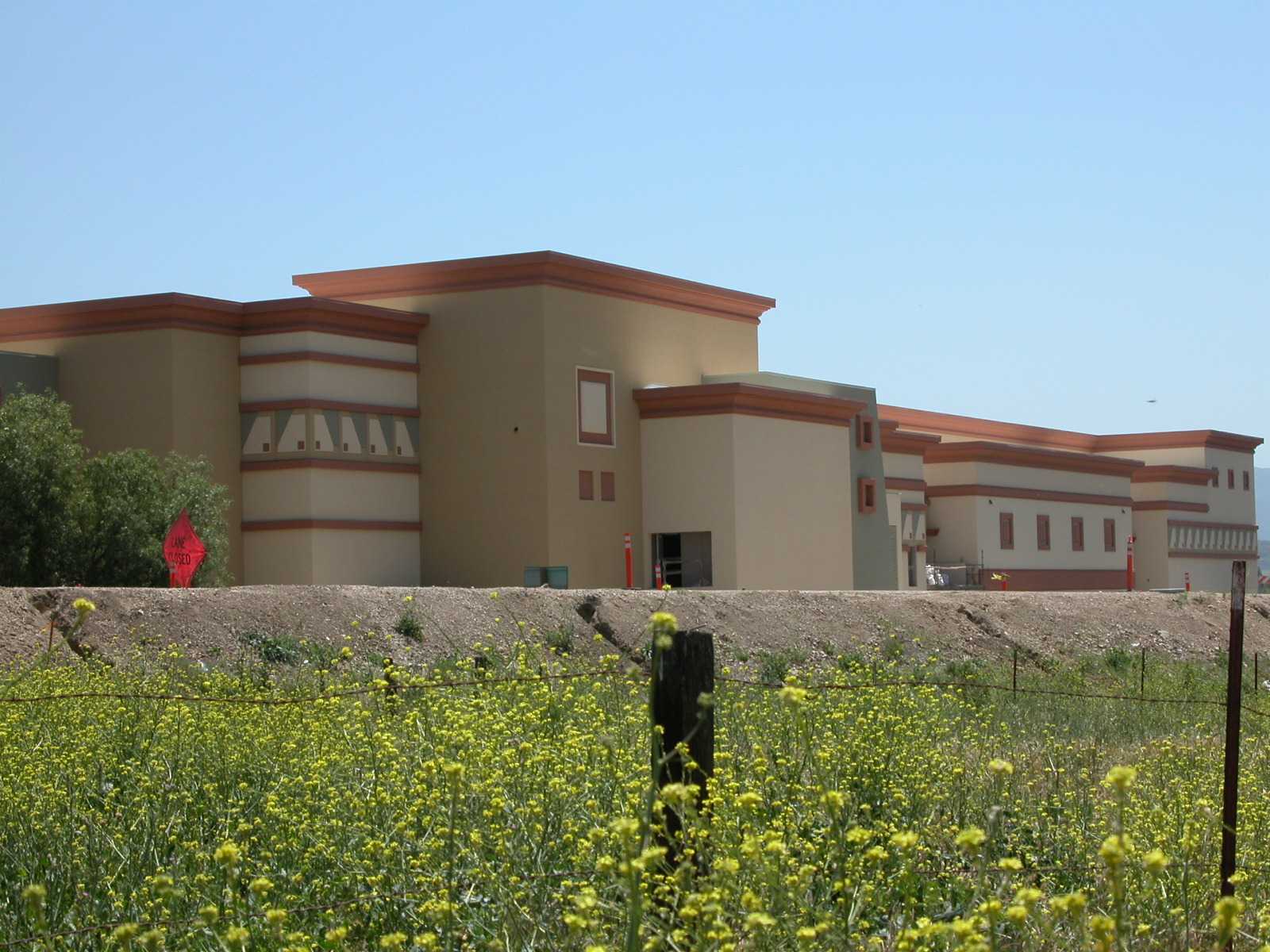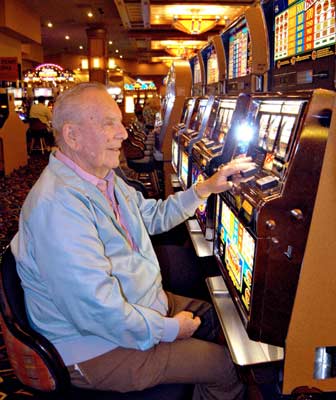 Another Stereotype of the Month entry:
Another Stereotype of the Month entry:
 Another Stereotype of the Month entry:
Another Stereotype of the Month entry:
Amador Ledger Dispatch
The little city and the big casinoFriday, August 22, 2003
- Eric Eckerstrom, Fiddletown
Once there was a small city, not a fancy city, but a nice place to live, where people didn't have to lock their doors and could walk down Main Street and say hello to their neighbors. The future looked bright for this city; it was in a beautiful place and people were moving to the area and coming as tourists, spending their money at local businesses.
Then some people came to the city with a plan. They wanted to create a foreign country within the city. They said this country would make the city rich. It could do this because they would start a business there that wasn't allowed in the country of the little city. People would give their money to this business and hope to get more in return -- something for nothing, or a lot for a little.
The foreign country would not have to obey any of the laws of the city or its country, but the new people promised to be nice to the city and give them some of the bundles and piles of money they would make.
The people weren't sure what to do. Their city needed money for their schools and water and sewer. But they also knew of other places that already had the same kind of nation and business within them and none of those places were happy about it.
They were told they couldn't stop the project even if they wanted to, and that if they tried they wouldn't be given anything. So the people thought: "This time it will be different. We can't win anyway, so let's take their money."
Many people came to work to build the new business and much money was spent and the people thought: "This is wonderful." Then finally the business opened. Many came to give the new business their money -- so many that the people of the little city couldn't drive to their work or their own businesses without long waits and some were even hurt by some of those who came and had too much of the drink that the new business sold and gave to them and couldn't drive on the small roads around the city.
Soon the people found that they had to lock their doors and the police had to come to keep bad things from happening because of all the people who came to give money. Some even spent all their time at the new business, thinking that if they gave enough money they'd get a lot more, but they didn't. They lost all they had and some even stole from others to keep trying.
It turned out that the money the city got from the business wasn't enough, and then the city asked for more, the business said: "We're not a part of your country; you can't make us do anything." So the people of the city had to pay out of their own pockets. The local businesses started to fail because no one came to them anymore. People gave their money to the business at the foreign country and the city didn't get any new tax money to pay for all the things the workers in the foreign country needed. Many came; some got paid to count the money, but most didn't get very much to sweep the floors and serve the drinks.
Things were all different. The people couldn't see the stars at night because the new business' neon lights that drew all the cars and gamblers lit up the sky. Instead of farms and beautiful country, the new business with all its money dominated things. Too late, the people realized that they had sold their way of life for a few dollars. Something far more valuable than the promises of the foreign nation and its business partners was lost. If only they had known, they would have fought to save the very things that brought them to their little city in the first place.
It is too late for the people in this fictional story, a fable that has been repeated across this great state. It is not too late for Plymouth and its surrounding area. The casino backers say: "The Ione Band of Miwok Indians is building a casino..." Do you see building going on? They are attempting to build a casino. There are many steps in that process yet to be completed. Approval by the Governor of California and by the Secretary of the Interior must be granted for a group to acquire lands for gaming purposes and the position of surrounding local governments must be taken into account. Your response and the position of the city council are very important.
No one can deny that injustices were committed against California's Native Americans in the past. First by the Spanish, then the Mexican, and then by the United States citizens and governments. Today the power of the vast sums of money, generated by Indian gaming, to influence government officials is creating another kind of injustice. Not only does Indian gambling impact surrounding communities without their consent, but much of the huge profit from Indian gambling goes to shadowy groups of handlers and financial backers.
An exercise of ordinary common sense will show that Plymouth is a completely inappropriate place to transform into a mini Las Vegas. The effects on the little city in the story are all supported by studies, experience and even "Time" magazine.
Where do you stand?

Rob's reply
I stand opposed to stereotypical screeds like this one. Among its gross distortions:
Indian nations have to obey many federal laws and some state laws. They generally choose to obey most laws because it's good policy.
There's no good evidence that Indian casinos cause big increases in crime. I'm guessing they encourage about as much crime as any business their size. How many crimes do the thousands of people at Disneyland commit each day, for instance? Does Eckerstrom think the city of Anaheim would trade the huge gains in tourism, consumer spending, and local employment for a small reduction in crime?
I've never heard anyone claim casinos are causing local businesses to fail before. Does Eckerstrom think casinos are competing with antique stores or wineries—not to mention drug stores or laundromats—for business? No, they're probably competing with other hotels and resorts in the region. How many rural areas have such amenities?
More likely, a casino creates businesses as patrons spend their money before, during, and after their visits. For instance, the car trips to the casino will generate a predictable amount of business for the local gas stations. Again, look at comparable situations. Are local businesses in Las Vegas unhappy because the casinos there are sucking them dry? How about the local businesses in Orlando since DisneyWorld opened?
The notion is patently ridiculous. Rural communities want big new enterprises (including Wal-Marts and prisons) because they believe these enterprises generate business for everyone, not just their owners. Communities may be mistaken about these enterprises, but belief in them is common.
Whereas there's no proof of businesses losing money when casinos arrive, there's plenty of proof that casinos provide scads of decent jobs for non-Indians. California's casinos are increasing their hiring faster than any other category of business. Eckerstrom is either ignorant of this fact or ignoring it to make his sob story worse.
The neon lights being so bright that locals can't see the stars is another claim I've never heard before. I'm guessing it's another invention from Eckerstrom's fervent imagination.
The local residents realizing they had sold their way of life is yet another claim Eckerstrom seems to have invented from whole cloth. From what I've read, most communities become more accepting of casinos as time goes by, not less. They realize the scare stories, like Eckerstrom's, are mostly false. And the benefits—the increased spending and employment—are mostly true.
Readers should take Eckerstrom's references to unnamed studies and "experience" with a shaker full of salt. If they're anything like his Time magazine reference, they're worthless. Dozens of critics have pointed out the flaws in Time magazine's "expose." And the expose was largely about how casinos aren't enriching Indians, not how they're impoverishing the surrounding communities.
The "handlers" and "backers" Eckerstrom refers to are the people who finance, build, and manage the casinos, if necessary. Does Eckerstrom think every non-Indian business finances a major construction project out of its own pocket? How naive can you get?
The Indian Gaming Regulatory Act caps the return that investors can earn and mandates that the income go for tribal services like health and education. That's more of a guarantee than non-Indian businesses like Enron or WorldCom give the American public. And how is this relevant to Eckerstrom's thesis? If crafty "backers" are taking money from gullible Indians, that doesn't make their casinos any more of a threat to local communities.
Eckerstrom is obviously projecting his fears in his fable, which he accurately labels a piece of fiction. I suspect he couldn't document any real harm from casinos, so he made up a story instead.
His time would be better spent fighting establishments like Wal-Mart, which actually do destroy mom 'n' pop businesses and suck a community dry. (Those who favor Wal-Marts initially often change their minds.) Casinos aren't the demons he makes them out to be.
Related links
Too-powerful Indians
Greedy Indians
The facts about Indian gaming
|
. . . |

|
All material © copyright its original owners, except where noted.
Original text and pictures © copyright 2007 by Robert Schmidt.
Copyrighted material is posted under the Fair Use provision of the Copyright Act,
which allows copying for nonprofit educational uses including criticism and commentary.
Comments sent to the publisher become the property of Blue Corn Comics
and may be used in other postings without permission.